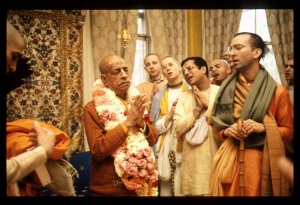SB 10.86.2-3: Difference between revisions
(Vanibot #0018 edit: make synonym terms in Sanskrit italic in SB - Vanisource) |
(Vanibot #0054 edit - transform synonyms into clickable links, which search similar occurrences) |
||
| Line 29: | Line 29: | ||
<div class="synonyms"> | <div class="synonyms"> | ||
''śrī-śukaḥ uvāca'' | ''[//vanipedia.org/wiki/Special:VaniSearch?s=śrī&tab=syno_o&ds=1 śrī]-[//vanipedia.org/wiki/Special:VaniSearch?s=śukaḥ&tab=syno_o&ds=1 śukaḥ] [//vanipedia.org/wiki/Special:VaniSearch?s=uvāca&tab=syno_o&ds=1 uvāca]'' — Śukadeva Gosvāmī said; ''[//vanipedia.org/wiki/Special:VaniSearch?s=arjunaḥ&tab=syno_o&ds=1 arjunaḥ]'' — Arjuna; ''[//vanipedia.org/wiki/Special:VaniSearch?s=tīrtha&tab=syno_o&ds=1 tīrtha]'' — to holy places; ''[//vanipedia.org/wiki/Special:VaniSearch?s=yātrāyām&tab=syno_o&ds=1 yātrāyām]'' — while on pilgrimage; ''[//vanipedia.org/wiki/Special:VaniSearch?s=paryaṭan&tab=syno_o&ds=1 paryaṭan]'' — wandering; ''[//vanipedia.org/wiki/Special:VaniSearch?s=avanīm&tab=syno_o&ds=1 avanīm]'' — the earth; ''[//vanipedia.org/wiki/Special:VaniSearch?s=prabhuḥ&tab=syno_o&ds=1 prabhuḥ]'' — the great lord; ''[//vanipedia.org/wiki/Special:VaniSearch?s=gataḥ&tab=syno_o&ds=1 gataḥ]'' — having gone; ''[//vanipedia.org/wiki/Special:VaniSearch?s=prabhāsam&tab=syno_o&ds=1 prabhāsam]'' — to Prabhāsa; ''[//vanipedia.org/wiki/Special:VaniSearch?s=aśṛṇot&tab=syno_o&ds=1 aśṛṇot]'' — heard; ''[//vanipedia.org/wiki/Special:VaniSearch?s=mātuleyīm&tab=syno_o&ds=1 mātuleyīm]'' — uncle's daughter; ''[//vanipedia.org/wiki/Special:VaniSearch?s=saḥ&tab=syno_o&ds=1 saḥ]'' — he; ''[//vanipedia.org/wiki/Special:VaniSearch?s=ātmanaḥ&tab=syno_o&ds=1 ātmanaḥ]'' — his; ''[//vanipedia.org/wiki/Special:VaniSearch?s=duryodhanāya&tab=syno_o&ds=1 duryodhanāya]'' — to Duryodhana; ''[//vanipedia.org/wiki/Special:VaniSearch?s=rāmaḥ&tab=syno_o&ds=1 rāmaḥ]'' — Lord Balarāma; ''[//vanipedia.org/wiki/Special:VaniSearch?s=tām&tab=syno_o&ds=1 tām]'' — her; ''[//vanipedia.org/wiki/Special:VaniSearch?s=dāsyati&tab=syno_o&ds=1 dāsyati]'' — intends to give; ''[//vanipedia.org/wiki/Special:VaniSearch?s=iti&tab=syno_o&ds=1 iti]'' — thus; ''[//vanipedia.org/wiki/Special:VaniSearch?s=na&tab=syno_o&ds=1 na]'' — not; ''[//vanipedia.org/wiki/Special:VaniSearch?s=ca&tab=syno_o&ds=1 ca]'' — and; ''[//vanipedia.org/wiki/Special:VaniSearch?s=apare&tab=syno_o&ds=1 apare]'' — anyone else; ''[//vanipedia.org/wiki/Special:VaniSearch?s=tat&tab=syno_o&ds=1 tat]'' — her; ''[//vanipedia.org/wiki/Special:VaniSearch?s=lipsuḥ&tab=syno_o&ds=1 lipsuḥ]'' — desirous of obtaining; ''[//vanipedia.org/wiki/Special:VaniSearch?s=saḥ&tab=syno_o&ds=1 saḥ]'' — he, Arjuna; ''[//vanipedia.org/wiki/Special:VaniSearch?s=yatiḥ&tab=syno_o&ds=1 yatiḥ]'' — a sannyāsī; ''[//vanipedia.org/wiki/Special:VaniSearch?s=bhūtvā&tab=syno_o&ds=1 bhūtvā]'' — becoming; ''[//vanipedia.org/wiki/Special:VaniSearch?s=tri&tab=syno_o&ds=1 tri]-[//vanipedia.org/wiki/Special:VaniSearch?s=daṇḍī&tab=syno_o&ds=1 daṇḍī]'' — carrying a triple staff; ''[//vanipedia.org/wiki/Special:VaniSearch?s=dvārakām&tab=syno_o&ds=1 dvārakām]'' — to Dvārakā; ''[//vanipedia.org/wiki/Special:VaniSearch?s=agāt&tab=syno_o&ds=1 agāt]'' — went. | ||
</div> | </div> | ||
Latest revision as of 20:09, 17 February 2024

A.C. Bhaktivedanta Swami Prabhupada
Please note: The synonyms, translation and purport of this verse were composed by disciples of Śrīla Prabhupāda
TEXTS 2-3
- śrī-śuka uvāca
- arjunas tīrtha-yātrāyāṁ
- paryaṭann avanīṁ prabhuḥ
- gataḥ prabhāsam aśṛṇon
- mātuleyīṁ sa ātmanaḥ
- duryodhanāya rāmas tāṁ
- dāsyatīti na cāpare
- tal-lipsuḥ sa yatir bhūtvā
- tri-daṇḍī dvārakām agāt
SYNONYMS
śrī-śukaḥ uvāca — Śukadeva Gosvāmī said; arjunaḥ — Arjuna; tīrtha — to holy places; yātrāyām — while on pilgrimage; paryaṭan — wandering; avanīm — the earth; prabhuḥ — the great lord; gataḥ — having gone; prabhāsam — to Prabhāsa; aśṛṇot — heard; mātuleyīm — uncle's daughter; saḥ — he; ātmanaḥ — his; duryodhanāya — to Duryodhana; rāmaḥ — Lord Balarāma; tām — her; dāsyati — intends to give; iti — thus; na — not; ca — and; apare — anyone else; tat — her; lipsuḥ — desirous of obtaining; saḥ — he, Arjuna; yatiḥ — a sannyāsī; bhūtvā — becoming; tri-daṇḍī — carrying a triple staff; dvārakām — to Dvārakā; agāt — went.
Translation and purport composed by disciples of Śrīla Prabhupāda
TRANSLATION
Śukadeva Gosvāmī said: While traveling far and wide visiting various holy places of pilgrimage, Arjuna came to Prabhāsa. There he heard that Lord Balarāma intended to give his maternal cousin Subhadrā to Duryodhana in marriage, and that no one else approved of this plan. Arjuna wanted to marry her himself, so he disguised himself as a renunciant, complete with triple staff, and went to Dvārakā.
PURPORT
Arjuna's plan for obtaining Subhadrā as his wife may have seemed unconventional, but he was not acting without encouragement; in fact, Lord Kṛṣṇa was his prime co-conspirator. And in Dvārakā, most of the members of the royal family, especially Vasudeva, were unhappy about giving their favorite daughter to Duryodhana.